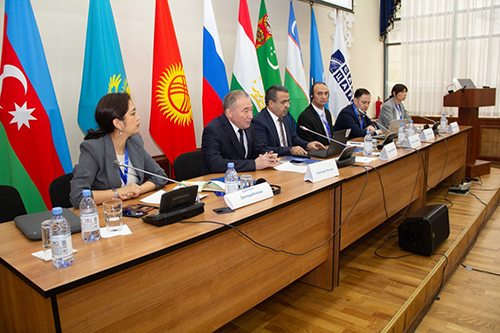From 16 to 19 April, UNODC and the Central Asian Regional Information and Coordination Centre (CARICC) co-organized a Regional Training on Investigation of Cybercrime Cases for prosecutors from Central Asia, with the participation of experts from the Judicial Cooperation Network for Central Asia and Southern Caucasus (CASC).
During the four-day training hosted at the CARICC in Almaty, Kazakhstan, prosecutors from Kazakhstan, the Kyrgyz Republic, Tajikistan, Turkmenistan, and Uzbekistan together with experts from Georgia, Uzbekistan and Qatar met to share good practices, challenges and cross-border cooperation needs to respond to the growing phenomenon of cybercrime. These threats have a significant impact on Member States in Central Asia, posing risks to the region’s digital infrastructure and overall cybersecurity. Cyber-enabled crime can occur in the offline world but can also be facilitated by information and communication technologies. This typically includes online fraud, the purchase of drugs on internet and online money laundering.
Opening the workshop, Mr. Atageldi Yazlyev, Director of CARICC, highlighted the timeliness of this training given the active development of information and communication technologies in the region, which in turn increases the risks of cyberthreats. He also recognized the positive outcomes of cooperation between the CARICC, UNODC and the CASC network, providing a regional training platform for investigations and judicial cooperation in Central Asia. “CARICC, as a regional organization, is the platform for law enforcement agencies of all participating countries of the Center and observer states to interact and we look forward to continued cooperation with UNODC”.
Mr. Yusuf Kurbonov, International Programme Coordinator at the UNODC Regional Office for Central Asia, highlighted the UNODC’s support to Member States in tackling the challenges posed by cybercrime worldwide. “Through capacity building, legislative support, training, and awareness-raising activities, the UNODC programme activities strengthen the ability of countries to prevent, detect, investigate, and prosecute cybercrimes effectively”. Cyber threats and trends for 2030, as well as the interaction between cyber trends and their impact on Central Asian countries were presented by Mr. Amr El Rahwan, UNODC Cybercrime Expert facilitating the training. Mr. El Rahwan is an expert from the UNODC Regional Center for Combatting Cybercrime in Doha. “The objectives of the Center are capacity-building and providing professional training for qualifying law enforcement, prosecutors, and judges for combating cybercrime in the MENA region and globally”, he explained.
Participants could engage in various practical exercises during the training, strengthening their skills on topics such as the detection and investigation of cybercrime cases. Thanks to the participation of UNODC experts and invited experts from the CASC Network, including Mr. Gayrat Musaev, Head of the Scientific and Methodological Center for Digital Forensics of the Law Enforcement Academy of Uzbekistan, Mr. Askarjon Zakirov, Expert and Head of Department at the National Agency of Perspective Projects of the Republic of Uzbekistan, and Ms. Tamar Bezhuashvili, Prosecutor at the Office of the Prosecutor General of Georgia and CASC Network Contact Point, participants could benefit from advanced sessions that included practical exercises and experience-sharing.
Topics covered included the detection of cybercrime and specific features of investigation of cybercrime; electronic evidence and its admissibility; the nature, tracing, seizure and recovery of cryptocurrencies; open-source intelligence and its role in investigation of cybercrime; specific features of combatting of the cybercrimes committed via the Darknet; artificial intelligence and person-centric Open Source Intelligence (OSINT); international cooperation; joint investigation teams and parallel investigation as effective instruments to combat cybercrime cases as well as sustainable training plans to address cybercrime threats. Participants could also benefit from Ms. Bezhuashvili’s experience in Georgia, sharing good practices on the Georgian cybercrime experience in relation to drug crime.
This four-day advanced training is co-organized by the Central Asian Regional Information and Coordination Centre (CARICC), in cooperation with the Judicial Cooperation Network for Central Asia and Southern Caucasus (CASC), with the financial support of the US State Department’s Bureau of International Narcotics and Law Enforcement Affairs (INL). ///UNODC Central Asia, 19 April 2024
